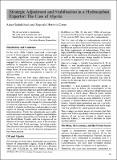| dc.contributor.author | Siabdelhadi, Amar | en |
| dc.contributor.author | Green, Reginald Herbold | en |
| dc.date.accessioned | 2016-04-07T14:08:49Z | |
| dc.date.available | 2016-04-07T14:08:49Z | |
| dc.date.issued | 01/01/1988 | en |
| dc.identifier.citation | Siabdelhadi, A. and Green, R., H. (1988) Strategic Adjustment and Stabilisation in a Hydrocarbon Exporter: The Case of Algeria. IDS Bulletin 19(1): 61-66 | en |
| dc.identifier.issn | 1759-5436 | en |
| dc.identifier.uri | https://opendocs.ids.ac.uk/opendocs/handle/20.500.12413/10445 | |
| dc.description.abstract | Summary Summary Algeria has carried out a nationally instituted strategic adjustment and a short term stabilisation exercise — in that order. While it has adopted a pro?agricultural incentives policy (with positive results), partial liberalisation of prices, a broader private sector role, it has done so within the framework of a centrally planned economy committed to very high levels of capital formation. Its 1986–87 stabilisation policy (with no application to the IMF) has been extremely austere with 70 to 75 per cent of terms of trade (oil and gas) export and government revenue losses covered by cuts in imports and government expenditure. While basic services and rural privation was experienced and dissatisfaction expressed by workers. As of mid?1987 stabilisation within the context of the preceding strategic adjustment has succeeded and been eased with the (accurately predicted) recovery of oil prices. Resumé Resumé Ajustement Stratégique et Stabilisation chez un Exportateur d'Hydrocarbone: Le Cas de l'Algérie L'Algérie a mené à bien une stratégie appliquée au niveau national et un exercise de stabilisation à court terme — dans cet ordre. Alors qu'elle adoptait une politique de stimulation pro?agricole, (avec des résultats positifs), la libéralisation partielle des prix, l'extension du role joué par le secteur privé, elle l'a fait au sein d'un plan d'économie centralisée, engagée dans la mise en place d'un très haut niveau de capitaux. Sa politique de stabilisation en 1986–87 (sans demande au IMF) a marque une période extrèmement austère avec de 70 a 75% de perte dans la balance des paiements à l'export (pétrole et gaz) et sur le revenu gouvernemental, couverte par des réductions à l'importation et dans les dépenses du gouvernement. Alors que les services de base et le développement rural étaient protégés, les salaires réels ne le furent pas, et les ouvriers firent l'experience de sévères privations et exprimèrent un profond mécontentement. A partir du milieu de l'année 1987, une stabilisation dans le contexte de l'ajustement stratégique se prouva un succès facilite par la remontée (prevision qui s'est averée juste) des prix du pétrole. | en |
| dc.format.extent | 6 | en |
| dc.publisher | Institute of Development Studies | en |
| dc.relation.ispartofseries | IDS Bulletin Vol. 19 Nos. 1 | en |
| dc.rights.uri | http://www.ids.ac.uk/files/dmfile/IDSOpenDocsStandardTermsOfUse.pdf | en |
| dc.title | Strategic Adjustment and Stabilisation in a Hydrocarbon Exporter: The Case of Algeria | en |
| dc.type | Article | en |
| dc.rights.holder | © 1988 Institue of Development Studies | en |
| dc.identifier.doi | 10.1111/j.1759-5436.1988.mp19001008.x | en |

